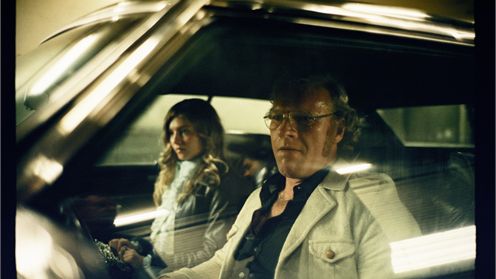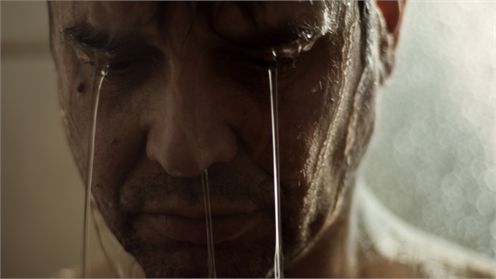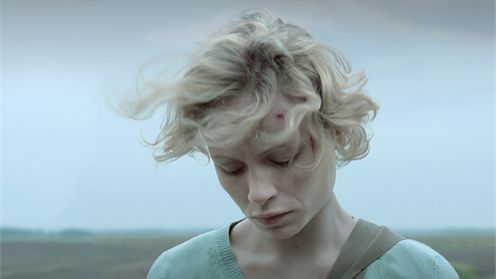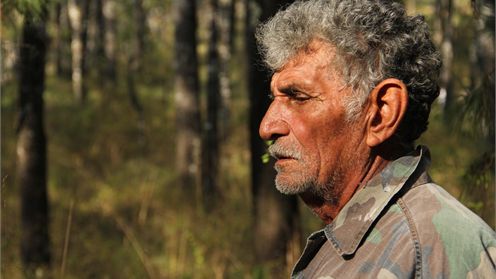The first weekend of the 42nd International Film Festival Rotterdam was marked by freezing cold weather, saw Bernardo Bertolucci come to town for a discussion with students, and left me surprised when the director of one of the films turned out to be the girl I had been standing behind in line just before the screening. This is typical of the festival: it is a place for filmmakers and their audience to meet and discuss, not for us to admire them from a distance. Filled to the brim with (often young) filmmakers from all over the world bringing their cinema, the program this year is as eclectic as ever. Hopefully, this small sample of reviews will show you just that.
De Wederopstanding Van Een Klootzak (Guido van Driel)
In English, the title of this film translates to The Resurrection of a Bastard, and the titular bastard is Ronnie, played by Yorick van Wageningen (The New World, The Girl With the Dragon Tattoo) as a criminal, recently released from hospital after an assassination attempt, now donning a neck brace. While one can discuss what his actual 'resurrection' is in the film, the fact that he is a bastard is perfectly clear from early on, as we witness him shaking down a drug dealer with some inventive usage of a vacuum cleaner. The story follows Ronnie and his bodyguard Janus in their search for the assassin in a small town, as the assassin happened to have the coat of arms of this town tattooed on his wrist. In parallel, it also follows the story of a young African asylum seeker, Eduardo, living in the same town, trying to build a new life away from the violence in his home country that still haunts him. Slowly but surely, their paths begin to merge, until they finally meet in a dramatic climax.
His origins as a comic writer shine through in director Guido van Driel's debut feature film, and it is clear he has an eye for arresting visuals. The climactic scene in particular is stunning, also showcasing his ability to create tension in a scene. The problem is, he doesn't really know how to gel these scenes together into a coherent film. Marred by a weak and convoluted script, and some wooden acting in a few of the supporting roles, the film is certainly enjoyable, but could have been a lot more. Van Wageningen shines in the central role of the paranoid Ronnie, who is shown fighting his own demons before the attempt on his life, and the young Goua Robert Grovogui is excellent as Eduardo. Furthermore, the cinematography alone is a reason to give the film a try, but in the end it feels like a missed chance to make something really memorable.
How to Describe a Cloud (David Verbeek)
 Director David Verbeek identified himself as Asian after the film (even though he is Dutch), so it should come as no surprise that his fifth feature film, the minimally budgeted How to Describe a Cloud, is again situated in the Far East (a return to Taiwan). The interesting thing is that, even though he is a Westerner by birth, his cinematic outings have a certain Asian sensibility. People who don't know his background might be surprised that the film is not made by a Chinese or Taiwanese director.
Director David Verbeek identified himself as Asian after the film (even though he is Dutch), so it should come as no surprise that his fifth feature film, the minimally budgeted How to Describe a Cloud, is again situated in the Far East (a return to Taiwan). The interesting thing is that, even though he is a Westerner by birth, his cinematic outings have a certain Asian sensibility. People who don't know his background might be surprised that the film is not made by a Chinese or Taiwanese director.
The film centers on Liling (a stellar performance by Hu Luang, who perfectly captures the inner feelings of her character in her eyes), a young woman working in Taipei, where she earns her living as an electronic musician. When her mother goes blind, Liling returns to the small coastal village of her birth to help her mother 'see' things by describing them to her. Her mother insists that she has developed a sixth sense which makes her 'feel' the presence of things she cannot see, and initially this collides with Liling's rational and, for lack of a better word, 'worldly' approach to the situation. As she travels back and forth between Taipei and her mother's home, however, she begins to shift towards the more spiritual and simpler life of her mother. Her existence in the city is largely disconnected, impersonal, and the only seemingly serious relationship she has there is with a retired biology professor, who now spends his days drawing otherworldly environments and creatures for science fiction comics and films. Their budding relationship will develop in unexpected ways, leaving the film with a whimsical but bittersweet ending that does give Liling full closure and a new view on life and spirituality.
The strength of Verbeek is that he manages to tell a lot with very little. His visual flair helps him capture Liling's state of mind in just a few images, using focus and blocking to signal the lack of grip on her life in the city, as well as creating a parallel to her mother's very real blindness. At the same time, he manages to create a certain sensuality in the scenes between Liling and her professor, and a stark but at times mysterious reality in the scenes at her mother's house. All that, combined with the small budget he was working on, shows that Verbeek is a real talent, and it seems only a matter of time before he makes a film that propels him into the competition at one of the bigger festivals (he was already in the Un Certain Regard sidebar in 2010). The small but excellent cast helps him create this simple story about spirituality in modern society, a struggle that is especially poignant in Asian society. Which shows that Verbeek may have been born a Westerner, but has developed a good understanding of Asian culture.
Call Girl (Mikael Marcimain)
 The links between Mikael Marcimain's debut film Call Girl and Tomas Alfredson's Tinker Tailor Solder Spy are manyfold: Marcimain was an assistant director on his illustrious countryman's film, using the same cinematographer (Hoyte van Hoytema, coincidentally born in Rotterdam), and the story is a political thriller set in the same timeframe of the '70s, only this time in Stockholm instead of London. The films also share the same reserved tension, often letting silence instead of music set the mood.
The links between Mikael Marcimain's debut film Call Girl and Tomas Alfredson's Tinker Tailor Solder Spy are manyfold: Marcimain was an assistant director on his illustrious countryman's film, using the same cinematographer (Hoyte van Hoytema, coincidentally born in Rotterdam), and the story is a political thriller set in the same timeframe of the '70s, only this time in Stockholm instead of London. The films also share the same reserved tension, often letting silence instead of music set the mood.
Call Girl follows Iris, a 14-year-old girl who is placed into a youth home because her mother cannot handle her. A rebellious teenager, her life is turned upside down when she and her friend Sonja fall into the hands of Dagmar Glans, a madam with a clientele in the highest echelons of Swedish society. Before long, Iris is a highly popular call girl, whose services are used by a large number of high-ranking Swedish politicians. This attracts the attention of the Swedish justice department, who are investigating Glans' activities in an attempt to bring her down. The potential political blowback, however, hampers the investigation from the inside, and with those on the tail of the madam being the only ones who can save Iris from a downward spiral of drugs and abuse, the film becomes a race for her life. Based on actual events in the mid-1970s, the story is set against a discussion in Swedish politics at the time of liberalising the laws on incest and pedophilia, and can be seen as an indictment of the free spirit of the '70s. But above all, Call Girl is a tense thriller that surely takes its time (the runtime is nearly two and a half hours), but also is a very mature first film for the director. While some might call the film a little pedestrian, many more seasoned directors would be proud of the solid work Marcimain delivers here. In a world where Argo looks set to win a Best Picture Oscar, making a film that rivals it in every way as your debut is not something to sneeze at.
Carne De Perro (Fernando Guzzoni)
 Chilean director Guzzoni's debut film (the festival is full of them) is a claustrophobic look at the life of a man (played by Alejandro Goic) who finds it increasingly hard to live with his past as a henchman during the rule of dictator Augusto Pinochet. A bundle of pent-up anger that is triggered by the smallest things, he is followed closely, very closely, by Guzzoni's camera. There are few shots that don't have him in at least half-frame, and he is often shot from behind, as if the character is hiding his identity, and a nod to the fact that many henchmen of the former dictatorship are still walking around freely, as unknown faces in the crowd. But freely does not mean happily. Guzzoni ruthlessly registers the anguish of a man trying to come to terms with his past, searching for some form of salvation (the true salvation at the end comes off as a bit of a cop-out) and redemption. But register is all Guzzoni does, because he neither condemns nor pities his subject, allowing his audience to understand that what this man has done may have been terrible, but that doesn't change the fact that he is still a person trying to exist in a society that has shut off the horrible past.
Chilean director Guzzoni's debut film (the festival is full of them) is a claustrophobic look at the life of a man (played by Alejandro Goic) who finds it increasingly hard to live with his past as a henchman during the rule of dictator Augusto Pinochet. A bundle of pent-up anger that is triggered by the smallest things, he is followed closely, very closely, by Guzzoni's camera. There are few shots that don't have him in at least half-frame, and he is often shot from behind, as if the character is hiding his identity, and a nod to the fact that many henchmen of the former dictatorship are still walking around freely, as unknown faces in the crowd. But freely does not mean happily. Guzzoni ruthlessly registers the anguish of a man trying to come to terms with his past, searching for some form of salvation (the true salvation at the end comes off as a bit of a cop-out) and redemption. But register is all Guzzoni does, because he neither condemns nor pities his subject, allowing his audience to understand that what this man has done may have been terrible, but that doesn't change the fact that he is still a person trying to exist in a society that has shut off the horrible past.
Such a reflective nature in film is generally not a bad thing, but it does require from the viewer a certain level of interest and commitment to the subject. If you don't have that, the film immediately becomes less interesting, since Guzzoni doesn't offer a lot of insight into an issue that is perhaps somewhat too regional. Find a bunch of people who have an affinity with the subject matter, and this film is bound to spark a heated discussion, but on a cold Sunday morning at 9:00 a.m. in a festival where people come to sample world cinema, this film will meet more shrugged shoulders than it probably deserves. If anything, people should at least see it for a very dedicated performance by the leading actor, Alejandro Goic.
Silent Ones (Ricky Rijneke)
 With the anecdotal evidence of the director's youth in hand (although at 31, she is older than I expected), it should come as no surprise that Silent Ones was yet another debut film, and a stunning one at that. Rijneke was born and raised in Rotterdam, so she was sort of playing a home game, but she squandered that advantage by shooting the whole film in Hungarian with an international crew.
With the anecdotal evidence of the director's youth in hand (although at 31, she is older than I expected), it should come as no surprise that Silent Ones was yet another debut film, and a stunning one at that. Rijneke was born and raised in Rotterdam, so she was sort of playing a home game, but she squandered that advantage by shooting the whole film in Hungarian with an international crew.
The film opens with a car turned over in a meadow, a young woman, Csilla, scrambling out, the obvious victim of a car accident. Dazed and confused by a concussion, she drops in the grass next to the car. Were there any other passengers in the car? In the next scenes, we see her boarding an international freighter as part of the crew, a ship run by the shady Gábor. Her only possession besides the clothes on her back is a small silver fish that used to belong to her kid brother, Isti. It turns out that he was also in the car, but was lost after the accident. Life on the ship is made hell by Gábor, who violates Csilla, and takes the only thing that physically connects her to her brother, the little piece of jewelry. The film jumps back five months, and we follow Csilla and Isti on their road trip towards Western Europe, as they take a number of odd jobs. The deep-felt connection between Csilla and her brother becomes apparent, and by the time we reach the accident the imminent loss of her brother weighs heavy on the film, only to be given a wry twist at the end.
A happy experience, this film is not. A story about two people on the edge of Western society, true 'silent ones,' people who would go unnoticed by most of us, anonymous. At least they have each other, as it is the two of them against the world, and they enjoy their freedom in the wide open spaces of the (mostly Dutch) countryside. The wide landscapes, shot through all four seasons, are strikingly beautiful, and punctuate Csilla's state of mind. In contrast, the scenes on the freighter never show the open water, confining Csilla to the labyrinthine interior of the ship's hull, with its cramped quarters and narrow hallways, the sound of engines and machinery constantly droning in the back. Csilla is now locked inside a miserable world, alone and lost, trying to find a way through the mazes of her mind, searching for what she will never find: the happiness and freedom that she had with her brother. After a brief return to Csilla on the ship, the final scene is delivered as a blow to the gut, leaving the audience in silence.
The strength of the film lies in part in its use of silence, at least as far as spoken word goes. There is very little dialogue, yet leading actress Orsolya Tóth and her young co-star Fatih Dervisoglu manage to convey a whole array of emotions in their facial expressions and looks. The chemistry between the two is amazing, and it lifts their scenes together above the mundanity of their actions, such as field work for a carrot farmer or selling cigarettes to truck drivers waiting for yet another border. They go unnoticed and are totally dependent on each other, and as such trust each other totally. This is what makes what comes before and after their time on screen together so devastating. Combined with an imagery that is often drained of color, yet exudes a curious warmth and feeling of comfort, Rijneke's film creates an atmosphere that emphasizes the bond between the two main characters. It is somewhat reminiscent of Bruno Dumont's Hors Satan, only much softer and warmer, making the punchline all the more wry. A powerful, very self-assured debut, Silent Ones confirms that this director is one to watch. Don't be surprised if this wins one of the Tiger Awards at the end of the festival.
Penumbra (Eduardo Villanueva)
 With not enough time to stay for the Q&A, I'm still not quite sure if Eduardo Villanueva's sophomore film, Penumbra (Half-shadow), is a scripted film or a socio-documentary about Mexican rural life. Although, if it is the former, one could still view it as the latter too. Following the old hunter Adelelmo and his wife Dolores, both well into the final stages of their lives, the film does very little but depict their day-to-day life, mostly focusing on Adelelmo's daily forays into the wild and rocky countryside to hunt for elusive deer. There is no plot to speak of, very little dialogue, and quite frankly, not a lot happens. Villanueva paints a picture of a world that is slowly dwindling (most youth from this area move to the cities), much like the life of his protagonist, and also accentuated by the use of light in most scenes, which were shot in the 'golden hour' between sunset and nightfall. In that sense, Villanueva is certainly 'painting,' as the cinematography is very evocative. What he is painting, however, is not. An impression of life can be interesting, but when it's as uneventful as this (slaughtering a chicken or changing a light bulb), then the impression becomes rather dull, however lazy a criticism that often is. Add to that a number of false endings (although perhaps that was more hope than anything), and you have a film that probably will be admired by few, but walked out on by many.
With not enough time to stay for the Q&A, I'm still not quite sure if Eduardo Villanueva's sophomore film, Penumbra (Half-shadow), is a scripted film or a socio-documentary about Mexican rural life. Although, if it is the former, one could still view it as the latter too. Following the old hunter Adelelmo and his wife Dolores, both well into the final stages of their lives, the film does very little but depict their day-to-day life, mostly focusing on Adelelmo's daily forays into the wild and rocky countryside to hunt for elusive deer. There is no plot to speak of, very little dialogue, and quite frankly, not a lot happens. Villanueva paints a picture of a world that is slowly dwindling (most youth from this area move to the cities), much like the life of his protagonist, and also accentuated by the use of light in most scenes, which were shot in the 'golden hour' between sunset and nightfall. In that sense, Villanueva is certainly 'painting,' as the cinematography is very evocative. What he is painting, however, is not. An impression of life can be interesting, but when it's as uneventful as this (slaughtering a chicken or changing a light bulb), then the impression becomes rather dull, however lazy a criticism that often is. Add to that a number of false endings (although perhaps that was more hope than anything), and you have a film that probably will be admired by few, but walked out on by many.
